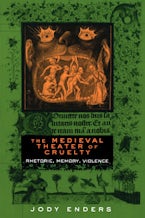A powerful discourse.... An eloquent reading of the blurring of the boundaries among theories of torture, rhetoric, and drama.
~Theatre Journal
An intellectually challenging... book that deserves serious consideration by medievalists.... The Medieval Theater of Cruelty offers invigorating new perspectives on violence in medieval drama as well as in all forms of aesthetic and rhetorical invention, and asks us to reconsider current pieties.
~Kathleen Ashley, Arthuriana
Enders presents her argument in such a careful manner that even the most conservative reader will find it persuasive.... I highly recommend The Medieval Theater of Cruelty not only for its content but also for its process: it stands as a fine example of how modern theory may responsibly be integrated into discussions of medieval texts.... An extremely well-written, persuasive, and stimulating book.
~Leanne Groenveld, Comparative Drama
The contemporary cultural currency of violent yet pleasurable entertainments—and their tendency to spill over into 'real life'—lends urgency to Enders's interrogation of the dark side of medieval spectacle and performance and to her powerful argument about how and why medieval rhetoric, violence, and theater can and should matter to us all.
~Theresa Coletti, Speculum
This book... should not be ignored by specialists interested in medieval drama or in the nature of violence in any period.
~Choice
This book is essential for those interested in late medieval theater and medieval rhetoric. It is replete with examples from both sources, and offers many readings of little-known or under-appreciated medieval plays—both mysteres and farces.... This is a very useful and interesting book, which I highly recommend. It is very thorough and very subtle in its core argumenst, and Enders is to be credited for her willingness to expand these arguments into larger theoretical contexts.... This book successfully crosses the boundary from medieval scholarship to broader, comparative issues in literary and cultural studies, and makes a powerful case for the continuing importance of the Western tradition of rhetoric in contemporary cultural life.
~Andrew Cowell, The Comparatist
This important new study returns to the topics of rhetoric and medieval drama but implicates these areas of this writer's interest and expertise with another topic about which she cares with equal passion: the historical continuity and seeming ubiquity of violence and cruelty.
~Ann Blake, Parergon

